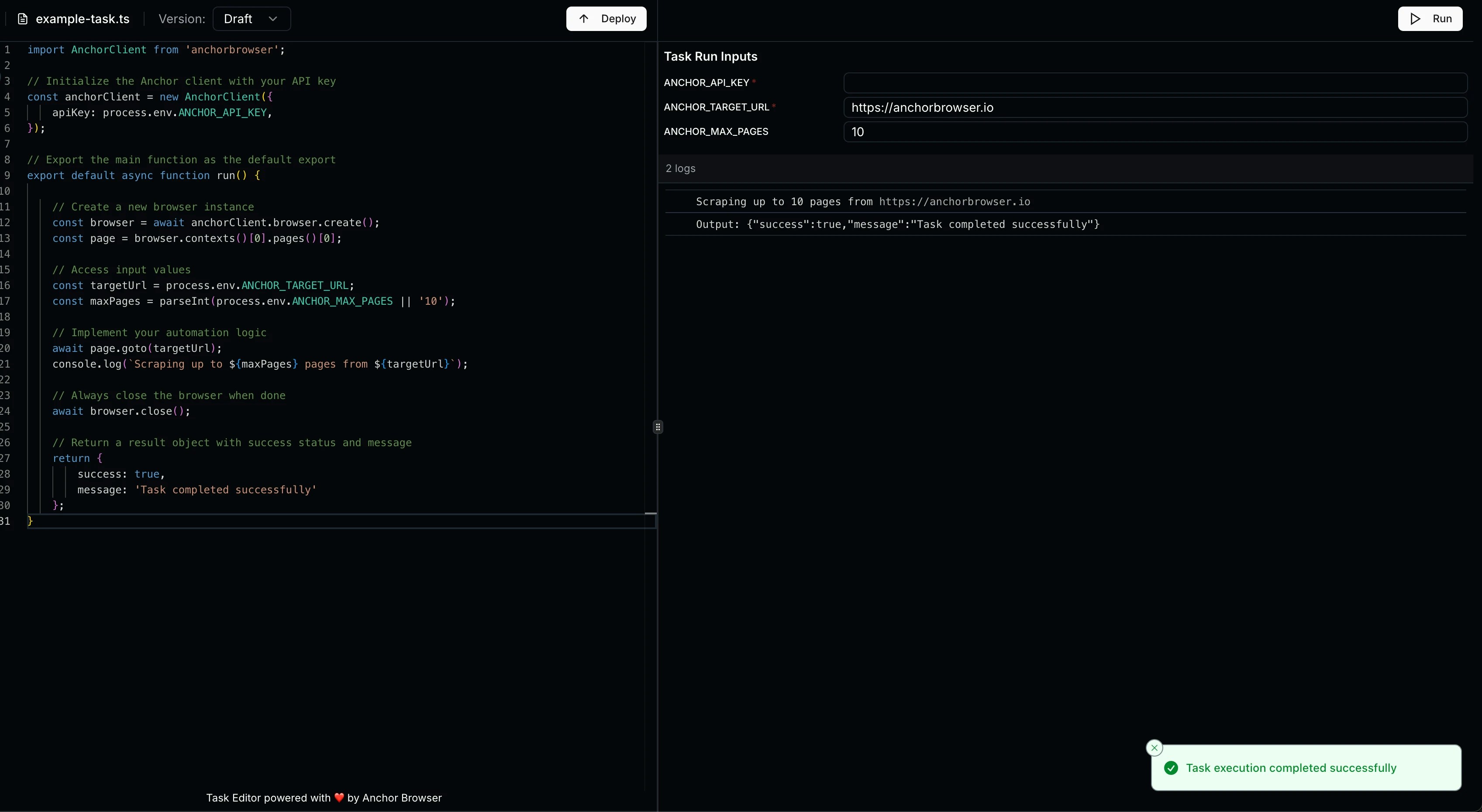Overview
The Tasks API enables you to create, version, and execute reusable browser automation code in your Anchor Browser sessions. Tasks allow you to:

Tasks are executed in a secure sandbox environment and can access the full Anchor Browser API for automation capabilities.
Creating Your First Task
Writing Task Code
For reliable execution, follow these guidelines:
- Write your code in TypeScript.
- Export a single default async function.
- In that function, return whatever your workflow requires as output (e.g., status, messages, domain data).
Tasks can receive values as inputs. All input names must be prefixed with ANCHOR_
Basic Task Example
import AnchorClient from 'anchorbrowser';
// Initialize the Anchor client with your API key
const anchorClient = new AnchorClient({
apiKey: process.env.ANCHOR_API_KEY,
});
// Export the main function as the default export
export default async function run() {
// Create a new browser instance
const browser = await anchorClient.browser.create();
const page = browser.contexts()[0].pages()[0];
// Access input values
const targetUrl = process.env.ANCHOR_TARGET_URL;
const maxPages = parseInt(process.env.ANCHOR_MAX_PAGES || '10');
// Implement your automation logic
await page.goto(targetUrl);
console.log(`Scraping up to ${maxPages} pages from ${targetUrl}`);
// Always close the browser when done
await browser.close();
// Return a result object with success status and message
return {
success: true,
message: 'Task completed successfully'
};
}
Using the SDK
Create your task in Anchor:
Save your typescript code as a .ts file
Make sure it follows the guidelines from above.
Get the base64 version of the file
Run the script to show your base64 file version# Convert your TypeScript file to base64
base64 -i your-task.ts
Create your Task in Anchor
import Anchorbrowser from 'anchorbrowser';
const client = new Anchorbrowser({
apiKey: process.env.ANCHORBROWSER_API_KEY,
});
// Create a new task
const task = await client.task.create({
name: 'example-task',
language: 'typescript',
description: 'A task to scrape product information from e-commerce sites',
code: "<base64-string>" // Replace with the output of the last step.
});
const taskId = task.data.id
console.log('Task created:', taskId);
Running Tasks
// Run the task with inputs
const execution = await client.task.run({
taskId: taskId,
version: 'draft',
inputs: {
ANCHOR_TARGET_URL: 'https://example.com',
ANCHOR_MAX_PAGES: '10'
}
});
console.log('Task execution started:', execution.data);
By default, the browser session is automatically closed when the task ends. Set cleanupSessions: false to keep the session open after task execution.

Deploy Task
// Deploy the task to make it available for production use
const deployment = await client.task.deploy({
taskId: taskId,
code: "<base64-string>", // Replace with the base64 encoded code
language: 'typescript',
description: 'Optional description for this version'
});
console.log('Task deployed:', deployment.data);
Async Task
By default, task execution is synchronous - the API call waits for the task to complete before returning results. For long-running tasks, you can use asynchronous execution to start the task and check results later.
Running Tasks Asynchronously
When you set async: true, the API returns immediately with a confirmation that the task has started. You can then poll for execution results using the task execution history endpoint.
// Run the task asynchronously
const execution = await client.task.run({
taskId: taskId,
version: '1',
async: true, // Enable async execution
inputs: {
ANCHOR_TARGET_URL: 'https://example.com',
ANCHOR_MAX_PAGES: '10'
}
});
console.log('Task execution started:', execution.data);
// Response: { async: true, success: true, message: 'Task execution started', taskId: '...' }
Checking Execution Results
After starting an async task, you can check its execution status and results by querying the task’s execution history endpoint:
// Get execution results
const response = await fetch(`https://api.anchorbrowser.io/v1/task/${taskId}/executions?page=1&limit=1&version=1`, {
headers: {
'anchor-api-key': process.env.ANCHORBROWSER_API_KEY,
'Content-Type': 'application/json'
}
});
const results = await response.json();
console.log('Execution results:', results.data);
{
"data": {
"results": [
{
"id": "550e8400-e29b-41d4-a716-446655440000",
"status": "success",
"executionTime": 5234,
"output": "{\"success\": true, \"message\": \"Task completed successfully\"}",
"errorMessage": null,
"startTime": "2024-01-15T10:30:00Z"
}
],
"pagination": {
"page": 1,
"limit": 1,
"total": 1,
"totalPages": 1
}
}
}
Async task executions have a maximum duration of 3 hours. Tasks that exceed this limit will be automatically cancelled.Note: Tasks must be deployed (not just in draft) to appear in the execution results list.
Polling for Results
For async tasks, you can implement polling to wait for completion:
// Poll for task completion
async function waitForTaskCompletion(taskId: string, maxAttempts: number = 60) {
for (let i = 0; i < maxAttempts; i++) {
const response = await fetch(`https://api.anchorbrowser.io/v1/task/${taskId}/executions?page=1&limit=1`, {
headers: {
'anchor-api-key': process.env.ANCHORBROWSER_API_KEY,
'Content-Type': 'application/json'
}
});
const results = await response.json();
const latestResult = results.data?.results?.[0];
if (latestResult) {
if (latestResult.status === 'success' || latestResult.status === 'failure') {
return latestResult;
}
}
// Wait 2 seconds before next poll
await new Promise(resolve => setTimeout(resolve, 2000));
}
throw new Error('Task execution timeout');
}
// Usage
const execution = await client.task.run({
taskId: taskId,
version: '1',
async: true,
inputs: { ANCHOR_TARGET_URL: 'https://example.com' }
});
const result = await waitForTaskCompletion(taskId);
console.log('Task completed:', result);
Support
For additional help with the Tasks API:



